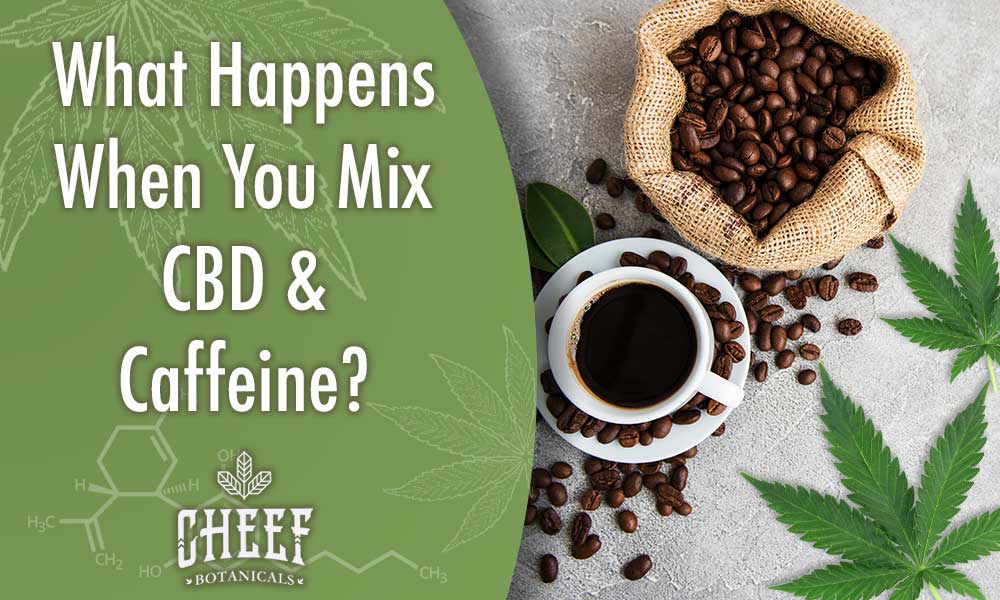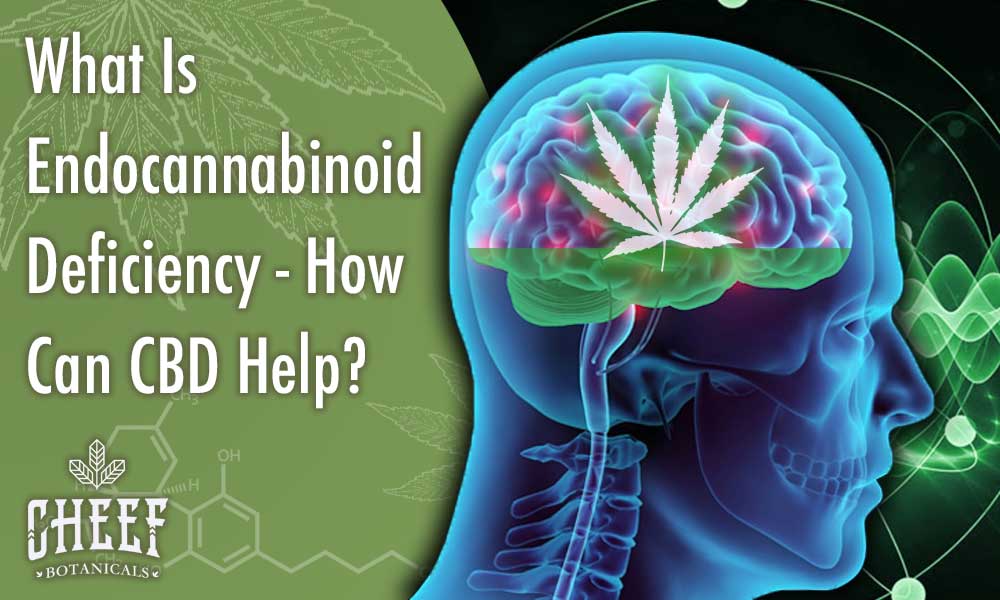What Happens When You Mix CBD and Caffeine?
Have you tried CBD and caffeine?
Cannabidiol (CBD) is all the rage now. This powerful cannabis extract is showing up in everything from beauty products to cheeseburgers, signaling that cannabis has gone truly mainstream. It seems like it's only a matter of time before your favorite coffee shop starts selling it too. But what happens when you add CBD, a sedative, to caffeine, a stimulant? Well, let’s take a closer look.
What is CBD?
Cannabidiol (CBD) is an extract of the famous cannabis plant. The legal version of CBD derives from the cannabis subspecies we call hemp, which contains 0.3% THC or less. CBD belongs to a group of chemicals known as cannabinoids. Cannabinoids can effectively be broken down into three primary categories:
Endocannabinoids
Also referred to as endogenous cannabinoids, these are produced naturally in the mammalian body.
Phytocannabinoids
These are extracts of the cannabis plant, like CBD, THC, CBN, CBG, plus many more.

Synthetic Cannabinoids
These are formulated in a laboratory setting. Be wary of these, there are many reports of synthetic cannabinoids having adverse effects.
Furthermore, cannabis is a complex plant with over 500 different compounds, of which over 100 are phytocannabinoids. The two most famous phytocannabinoids are:
Cannabidiol (CBD)
First discovered in 1940 by Dr. Roger Adams and his research team at the University of Illinois. However, it wasn’t until 1963 that Raphael Mechoulam fully explained its structure. With the discovery of the endocannabinoid system (ECS) in the early 1990s, CBD has been the subject of intense research because it does not cause intoxication, is extremely safe, and may have a wide variety of potential benefits.
Delta-9-tetrahydrocannabinol (THC)
This is arguably the most famous phytocannabinoid in the world. Dr. Mechoulam’s team clarified its structure 1964, one year after they did the same with CBD. In this paper, they described it as an “active constituent of hashish.” This simply means that it is the intoxicating component of marijuana, hence its widespread popularity.
Despite having the same chemical formula, CBD and THC have different structures. This means that CBD does not cause intoxication and has slightly different effects. In fact, famed cannabis researcher Vincenzo Di Marzo has noted that CBD may be “
What Does CBD and Caffeine Feel Like?
What Does CBD Feel Like?
We know that CBD will not intoxicate or impair us, but that doesn’t mean it has no effect on how we feel, however subtle that effect might be? Let's not forget that CBD is a versatile compound with many mechanisms of action and there is substantial evidence that it can act as a sedative.
- A 2004 study in the Journal of Clinical Psychopharmacology indicated that lower doses of CBD (15 milligrams) may have alerting or stimulating properties in healthy subjects. In fact, there was evidence that CBD may counteract the residual intoxicating and sedating properties of THC. These subjects reported feeling “clear-minded” and “quick-witted” on the CBD while feeling “fuzzy” on the THC.
- At higher doses, however, CBD makes subjects feel very different. A 1981 study indicated that doses of 160 milligrams helped sedate patients and increase their sleep duration. Another study from 1993 indicated that subjects who took 300 milligrams or 600 milligrams reported significant sedation when compared to the placebo.
What Does Caffeine Feel Like?
Caffeine, on the other hand, is undeniably a stimulant. Did you know 90% of people consume some amount of caffeine every day? It's true.
Let’s take a moment to examine how this powerful stimulant affects the central nervous system (CNS). First of all, it is both water- and fat-soluble, meaning that it can easily cross the blood-brain barrier as well as pretty much every other cellular membrane in our bodies.
Additionally, its chemical structure is extremely similar to a molecule called adenosine, which acts as a CNS depressant. It is so similar, in fact, that it attaches to adenosine-specific receptors in the CNS and induces a reaction that is the exact opposite of adenosine (stimulation instead of sedation). In the striatum of the brain, caffeine also increases levels of dopamine, the neurotransmitter responsible for pleasure, focus, attention, and movement.
Furthermore, when caffeine is metabolized, it is broken down into the following molecules:
Paraxanthine (84%)
Acts as a CNS stimulant that releases fat to fuel muscles and increases the amount of epinephrine in the blood.
Theobromine (12%)
This stimulant and diuretic dilates blood vessels and increases the flow of nutrients and oxygen to the brain.
Theophylline (4%)
This final metabolite increases heart rate and the force of cardiac contractions.
So what does all this mean? This is all just an elaborate way of saying that caffeine really pumps you up and gets the body going. If you mixed CBD with caffeine, doesn’t it seem like they would effectively cancel each other out? Not according to anecdotal evidence!
In fact, many users report a sense of clear-headed alertness without the harsh edge of caffeine. According to cannabis entrepreneur Jewel Zimmer, people who mix CBD and caffeine, “
Can You Mix CBD in Your Coffee?
Everyone loves coffee; seriously, it makes the world go round. At the same time, CBD is starting to catch on, though it’s not nearly as popular yet. Remember that coffee (and its high caffeine content) is a powerful stimulant while CBD is largely known for its more sedating properties.
It may seem like mixing the two would be counterproductive or even unpleasant, but that doesn’t appear to be the case. Don’t forget that the anecdotal evidence so far seems to be positive. It may seem counterintuitive, but it appears as if mixing CBD with a caffeinated beverage like coffee may be quite beneficial.
There is some research that has analyzed what happens when CBD and caffeine are combined, including a 2018 study in The Journal of Internal Medicine. According to its conclusions, cannabis and coffee activate many of the same metabolic pathways in the brain. Consequently, neurotransmitters in the endocannabinoid system (ECS) actually decrease after four to eight cups of coffee in a day.
So yes, you absolutely can mix CBD with your coffee!
How Much CBD Should You Mix with Caffeine?
Let’s take a moment to consider the relative safety of CBD and caffeine. For starters, CBD is exceptionally safe. No overdose from CBD alone has ever been recorded and a 2011 study in Current Drug Safety concluded that:
- A human could ingest up to 1,500 milligrams a day with no serious side effects.
- Approximately 20,000 milligrams (or 20 grams) of CBD would have to be ingested very quickly in order for the dose to be potentially toxic.
That is a tremendous amount of CBD! No commercially-available CBD product could even come close to that amount. A standard starting dose is 0.25 to 0.5 a person’s body weight. So a person weighing 200 pounds would start with between 50 and 100 milligrams. As you can see, that is far below the 1,500 milligrams established in this study.

CBD Dosing Sizes
We recommend you stick to adding a regular or strong dose of CBD to your caffeine drinks. This way you will get an adequate dose of CBD and avoid ingesting too much. For more information regarding your personal dosage size of CBD check out our easy-to-use dosing chart.
Caffeine Serving Amounts
Caffeine, on the other hand, can have some unfortunate side effects if taken in excess. These include:
- Anxiety
- Headaches
- Insomnia
- Gastrointestinal distress
- High blood pressure
- Rapid or irregular heart rate
- Heartburn
- Irritability
- Dehydration
- Muscle breakdown
It should be noted that this excess of caffeine may effectively reverse the beneficial effects of CBD. So how much caffeine should be ingested daily? Generally, it is recommended that adults limit their caffeine intake to no more than 400 milligrams per day (about four 8-ounce cups of regular coffee). Furthermore, pregnant or breastfeeding women should limit their intake to no more than 300 milligrams per day (about three 8-ounce cups of regular coffee).
So, if you keep your CBD plus caffeine intake below these recommended levels, then you should be absolutely fine. In fact, you may find yourself enjoying the unique effects of mixing CBD with coffee, giving you that boost to your wellness and vibrant energy you need to make each day count!. You can read more here.




 CBD Gummies - Top Seller
CBD Gummies - Top Seller
 CBD + THC Gummy - Excellent Choice
CBD + THC Gummy - Excellent Choice
 CBD Hemp Flower - Highly Rated
CBD Hemp Flower - Highly Rated
 Full Spectrum CBD Oil - Good Value
Full Spectrum CBD Oil - Good Value



Leave a comment
This site is protected by hCaptcha and the hCaptcha Privacy Policy and Terms of Service apply.